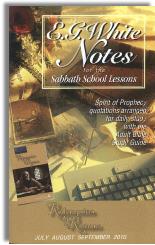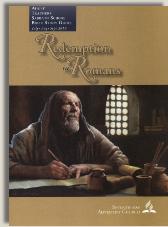|
||||||||||||||
Commentary on "Justification and the Law"
Day 2: Sunday, July 25, 2010 - The Law Established
Overview
Do we then overthrow the law by this faith? By no means! On the contrary, we uphold the law. (Rom. 3:31 ESV)
This is the Quarterly lesson introduction for today:
“In this passage, Paul states emphatically that faith does not make void God’s law. Even those who kept the law, even the entire Old Testament corpus of law, were never saved by it. The religion of the Old Testament, as that of the New, was always one of God’s grace given to sinners by faith.”
Observations
Note well that Paul is primarily addressing Christians in the City of Rome. This is a key concept for our own understanding of Scripture and this epistle in particular.
The only valid way to understand the book of Romans is to be a born again Christian indwelt by the Holy Spirit who will then lead you into all truth of God’s word. Whether you are a student being taught by a Holy Spirit gifted teacher or are searching God’s word in personal study, the role of the Holy Spirit is critical to discerning God’s truth.
If we honestly wish to learn God’s truth it is counterproductive and rather deceptive to patch verses together that have been removed their context and then use this to alter the clear teaching of the bible, especially this epistle. Rather, we should approach our study by working sequentially through each verse and chapter of Romans, thereby developing a clear understanding of the great themes Paul introduced in the introductory verses of chapter one. As such, we need to back up somewhat if we are to properly understand what Paul is saying in Romans 3:31. If necessary, you should return to the beginning and work your way back forward.
As you come to Romans 1:18 notice that the wrath of God is directed “against all ungodliness and unrighteousness of men”. The rest of chapter one shows that all sinners are without excuse. Romans 2:1 then summarizes this by focusing on those who would presume to judge others without examining themselves.
Midway into chapter two we come to this key passage concerning God’s judgment and the Law:
For all who have sinned without the law will also perish without the law, and all who have sinned under the law will be judged by the law. For it is not the hearers of the law who are righteous before God, but the doers of the law who will be justified. (Rom. 2:12-13 ESV)
Clearly no sinner has ever kept the law, not even parts of the law. As sinners, born in sin, we are total failures, with or without the attempted keeping of the Law.
as it is written: "None is righteous, no, not one; no one understands; no one seeks for God. All have turned aside; together they have become worthless; no one does good, not even one." (Rom. 3:10-12 ESV)
To be righteous before God through the Law, you must be doers of the Law. That means you must perfectly perform all the requirements of the law all the time. We must look elsewhere for our salvation because we are all sinners and have failed to obey or keep even a small portion of God’s law at any time of our lives.
But now the righteousness of God has been manifested apart from the law, although the Law and the Prophets bear witness to it-- the righteousness of God through faith in Jesus Christ for all who believe. For there is no distinction: for all have sinned and fall short of the glory of God, and are justified by his grace as a gift, through the redemption that is in Christ Jesus, whom God put forward as a propitiation by his blood, to be received by faith. This was to show God's righteousness, because in his divine forbearance he had passed over former sins. (Rom. 3:21-25 ESV)
Our utter failure to keep the law is meant to point to the only possible solution which God first proclaimed in Gen. 3:15. Jesus Christ, the perfect righteous Son of God who knew no sin would be the one to strike the fatal blow upon the head of the serpent. He took upon himself our sins while on the cross, carried our sins to the grave, a place unknown to any of us still living on this earth, and gave us life eternal through his resurrection.
When Paul upholds the law in Romans 3:31 he is pointing to our utter failure to keep the law and contrasts that with the atoning work of Jesus Christ as our Savior. Jesus Christ’s victory over sin was foreknown before time began and promised from the moment he pronounced a curse on Satan. God’s promises are totally trustworthy and perfect. Therefore, there never was a time when Jesus’ victory over sin was not assured. The Father promised and Jesus could not have failed.
It is contradictory for the lesson author to quote Rom. 3:31 with reference to verses 20-23 and then concluded that the law is still binding. In the very next chapter, which is centered on the faith of Abraham, Paul develops the understanding that upholding the law is centered on the hard reality that no sinner has or ever will be able to keep any part of the law, not even Abraham who lived long before the giving of the written Mosaic Law.
It is rather pointless to refer in the lesson to those who have kept the Law, since no sinner has ever kept any part of the law, much less the entire law. In upholding the law, we must remember that all have sinned, including Abraham who came long before the giving of the law. Only someone without sin could keep the law. In upholding the law, Paul is pointing to Jesus Christ as the only possible solution to our dilemma.
It is an Adventist false claim that the moral parts of the Mosaic Law are still binding upon God’s people. In Scripture the Mosaic Law is always referred to as a single entity and is never separated in parts. All the law is still binding as a single unit or none of it. When Paul upholds the law, he is referring to all the law, not parts.
It is not honest of the lesson author to state that we have eternal life without mentioning the Adventist claim that we cannot know we are saved until the results of the Investigative Judgment are made known.
It is contradictory to agree that we are not saved by the works of the Mosaic Law and then in the same breath make claim that the performance of the Ten Commandments is still binding upon us as born again members of the Body of Christ.
Summary
- There are at least four reasons why Paul upholds the law:
- It defines in limited written terms what it means to be righteous before our infinitely righteous God.
- It demonstrates to all mankind our utter failure to meet even a small part of his righteous standard with no humanly devised escape possible.
- It points to the gospel message of the cross. Jesus Christ is the only one who could and would atone fully for our sins with his own holy blood, descend into the grave and give us eternal life through his resurrection.
- The fulfillment of the Law by Jesus Christ demonstrates that the ordained promises of God can never fail.
Copyright 2010 BibleStudiesForAdventists.com. All rights reserved. Revised July 12, 2010. This website is published by Life Assurance Ministries, Glendale, Arizona, USA, the publisher of Proclamation! Magazine. Contact email: BibleStudiesForAdventists@gmail.com.
The Sabbath School Bible Study Guide and the corresponding E.G. White Notes are published by Pacific Press Publishing Association, which is owned and operated by the Seventh-day Adventist church. The current quarter's editions are pictured above.
Official Adventist Resources
Standard Edition Study Guide Week 5
Teacher's Edition Study Guide Week 5
Easy Reading Edition Study Guide Wk 5
Search the Complete Published Ellen G. White Writings


